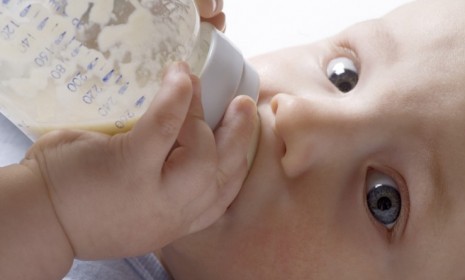Why moms stop breast-feeding early: 3 theories
A new study finds that the majority of women who intend to feed their babies breast milk for a set period wind up falling short of their goals

A free daily email with the biggest news stories of the day – and the best features from TheWeek.com
You are now subscribed
Your newsletter sign-up was successful
Increasingly, new mothers who plan to breast-feed their babies are giving up early, according to a study published Monday in the journal Pediatrics. Of the 1,457 pregnant women interviewed by researchers, 85 percent said they intended to breast-feed exclusively for at least three months, but only 32 percent met their goal. Fifteen percent stopped nursing before they even left the hospital. Why are so many new moms stopping early? Here, three theories:
1. Their plans are being thwarted... by hospitals
One of the main problems, says Stephanie Hanes at The Christian Science Monitor, is that our hospital system is "set up to hinder, rather than help, nursing." Everyone in the medical world knows that breast milk gives newborns loads of health benefits — the American Academy of Pediatrics recommends six months of breast-feeding. Hospitals could help by providing lactation consultants, encouraging moms to nurse, and avoiding formula whenever possible. Instead, moms are bombarded with pamphlets for formula in doctors' offices, and most hospitals routinely give formula to healthy breast-feeding infants. No wonder so many women give up.
The Week
Escape your echo chamber. Get the facts behind the news, plus analysis from multiple perspectives.

Sign up for The Week's Free Newsletters
From our morning news briefing to a weekly Good News Newsletter, get the best of The Week delivered directly to your inbox.
From our morning news briefing to a weekly Good News Newsletter, get the best of The Week delivered directly to your inbox.
2. Moms don't get enough support outside the hospital, either
It's not just hospitals, says Miriam Falco at CNN. More than half the moms in the study stopped breast-feeding within two months, which is when most of those with jobs go back to work. New moms need more encouragement — from family members, and even pediatricians — "to stick with it, even when it is difficult." And employers are part of the problem, too, as many women who return to the workplace "find it impossible to pump breast milk, either due to lack of time or proper facilities."
3. Our culture makes breast-feeding moms uncomfortable
"We are a bottle culture," says Dr. Claire McCarthy at The Boston Globe, "and a culture that sexualizes breasts." Even though nursing moms are doing the most natural, wholesome thing in the world — feeding a baby — they're often "made to feel unwelcome or uncomfortable when they do so in a public place." If we're going to raise breast-feeding rates in the U.S., we're all going to have to get over it, and "make it truly okay for women to breast-feed wherever they need to (gosh, I wish that were as simple as it sounds)."
A free daily email with the biggest news stories of the day – and the best features from TheWeek.com
-
 How the FCC’s ‘equal time’ rule works
How the FCC’s ‘equal time’ rule worksIn the Spotlight The law is at the heart of the Colbert-CBS conflict
-
 What is the endgame in the DHS shutdown?
What is the endgame in the DHS shutdown?Today’s Big Question Democrats want to rein in ICE’s immigration crackdown
-
 ‘Poor time management isn’t just an inconvenience’
‘Poor time management isn’t just an inconvenience’Instant Opinion Opinion, comment and editorials of the day